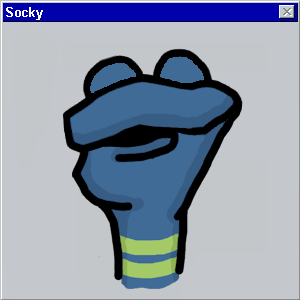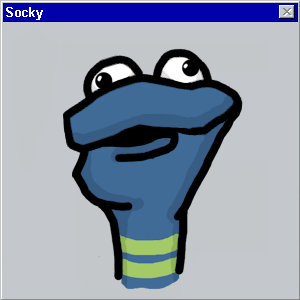A keyboardless keyboard
November 16, 2001 8:45 AM Subscribe
A keyboardless keyboard, a keyboard that constructs characters in any language, and a thing that does everything else. New gizmos on display at Comdex.
The Senseboard looks wacky! Now is it a standard keyboard or a Microsoft natural keyboard? I can't quite see from the picture.
posted by dlewis at 8:50 AM on November 16, 2001
posted by dlewis at 8:50 AM on November 16, 2001
I don't know how to type "correctly." I think I'd be SOL on the first keyboard.
posted by Hankins at 9:45 AM on November 16, 2001
posted by Hankins at 9:45 AM on November 16, 2001
i was thinking the same thing...i type weird, good...but weird...and unless those were trainable i'd have problems.
...and if you could train it...in theory you eventually make more and more subtle movements--think of the benefits for people with limited movement--That is so sci-fi. Love that.
posted by th3ph17 at 9:57 AM on November 16, 2001
...and if you could train it...in theory you eventually make more and more subtle movements--think of the benefits for people with limited movement--That is so sci-fi. Love that.
posted by th3ph17 at 9:57 AM on November 16, 2001
The Sense board is a stupid idea. Wait, it's a cool idea, but I don't see how it'll ever be usable. There's no tactile feedback. How would you know you were hitting the right key, or any "key" at all for that matter?
posted by bradlauster at 10:10 AM on November 16, 2001
posted by bradlauster at 10:10 AM on November 16, 2001
Cool idea... for mimes.
For grins, I just tried "typing" on my desk. It made my brain hurt. And my shoulders. And I think I was very slow and inaccurate.
I never really thought about the keyboard's mechanical nature before, but it's very much a tactile, physical thing, more related to a a fork or a screwdriver than a piece of paper. Maybe the reason those perfectly flat touch-sensitive keyboards from the mid-eighties never took off was because our hands and brains want to interact with things that move and change. Another argument could be the success of tiny keyboard buttons on VIMs instead of just indicating buttons on a PDA screen.
posted by joemaller at 10:12 AM on November 16, 2001
For grins, I just tried "typing" on my desk. It made my brain hurt. And my shoulders. And I think I was very slow and inaccurate.
I never really thought about the keyboard's mechanical nature before, but it's very much a tactile, physical thing, more related to a a fork or a screwdriver than a piece of paper. Maybe the reason those perfectly flat touch-sensitive keyboards from the mid-eighties never took off was because our hands and brains want to interact with things that move and change. Another argument could be the success of tiny keyboard buttons on VIMs instead of just indicating buttons on a PDA screen.
posted by joemaller at 10:12 AM on November 16, 2001
i was thinking the same thing...i type weird, good...but weird...and unless those were trainable i'd have problems.
I imagine you wear the thing while typing on a real keyboard until the software decides it has learned how you type.
I just tried an imaginary paragraph on my lap, and decided I'd love one of these.
posted by straight at 10:19 AM on November 16, 2001
I imagine you wear the thing while typing on a real keyboard until the software decides it has learned how you type.
I just tried an imaginary paragraph on my lap, and decided I'd love one of these.
posted by straight at 10:19 AM on November 16, 2001
I wouldn't like the feeling of tapping my fingers on the table. This would only be good for people that've learned how to type correctly, without looking at their fingers. Personally, I've been typing, self-taught for over ten years, but I still look at my fingers every now and then. It's mostly just to reassure myself, but I would be scared of using such a device. Personally, I like having a good keyboard, that I've broken in myself, and such. It's akin to having that favorite guitar to play.
posted by trioperative at 10:21 AM on November 16, 2001
posted by trioperative at 10:21 AM on November 16, 2001
How would you know you were hitting the right key, or any "key" at all for that matter?
You'd still be looking at a screen (pda, smartphone etc.). The sight of 30 people at a press conference all drumming their fingers nervously on their tabletops might take a little getting used to, though.
posted by liam at 10:35 AM on November 16, 2001
You'd still be looking at a screen (pda, smartphone etc.). The sight of 30 people at a press conference all drumming their fingers nervously on their tabletops might take a little getting used to, though.
posted by liam at 10:35 AM on November 16, 2001
The future comes in faster and faster these days. I remember, as a teen, reading the description in one of Harry Harrison's "Stainless Steel Rat" books of a watch-sized computer with holographic keyboard, and thinking, wow, cool concept but it'll never happen. The last few years must have created real-world versions of hundreds of other forgotten bits of cool SF gadgetry that even the authors probably thought would never happen. Now even the Dick Tracy two-way wrist TV is almost a reality... Anyone else got any favourites?
posted by Hogshead at 3:03 PM on November 16, 2001
posted by Hogshead at 3:03 PM on November 16, 2001
I can't even imagine. Since I only can use 7 out of my ten fingers to type, my typing style is unorthodox, to say the least. It'd never work for me.
Besides, it gives me the creeps for some reason.
posted by mattee at 3:09 PM on November 16, 2001
Besides, it gives me the creeps for some reason.
posted by mattee at 3:09 PM on November 16, 2001
...thinking it would be cool to wear while asleep, to see what happens...
posted by th3ph17 at 5:58 PM on November 16, 2001
posted by th3ph17 at 5:58 PM on November 16, 2001
I got a quick look at the Senseboard. It is a little plastic thing strapped across your palm with pressure sensors embedded, it senses the pressure changes across your palm as you move your fingers across the imaginary keys.
It does need to be trained. The guy demoing made some mistakes (b instead of v, etc) but it had some kind of auto-correct pop-up list to speed things up. It also had some kind of on/off sensing from hand position.
They said they were 6 months to a year away from market.
posted by mutagen at 7:18 PM on November 16, 2001
It does need to be trained. The guy demoing made some mistakes (b instead of v, etc) but it had some kind of auto-correct pop-up list to speed things up. It also had some kind of on/off sensing from hand position.
They said they were 6 months to a year away from market.
posted by mutagen at 7:18 PM on November 16, 2001
« Older Subway Navigator | (NYT) It is not just the poverty, Newer »
This thread has been archived and is closed to new comments


posted by liam at 8:48 AM on November 16, 2001